How To Clean Malware From Iphone
How do you know if your phone has a virus? It doesn't — there's no such thing as viruses on Android or iPhone viruses. But phones can definitely get other forms of malware. If your phone is showing the typical symptoms of a malware infection, learn to get rid of malware manually or use a virus removal tool — or an anti-malware scanner — to clean it up automatically. Read on for Android virus removal tips, or skip down to learn how to remove an iPhone virus. Then, find out how to use a malware cleaner to remove malicious apps and run a phone virus scan. If you're dealing with a virus or malware on your PC or Mac, don't miss our expert guide to removing malware from your computer.
How to remove a virus from an Android phone
-
Clear your cache and downloads.
Open your Settings, go to Apps & notifications, and select Chrome. In the Storage & cache menu, follow the steps to clear your cache and storage.
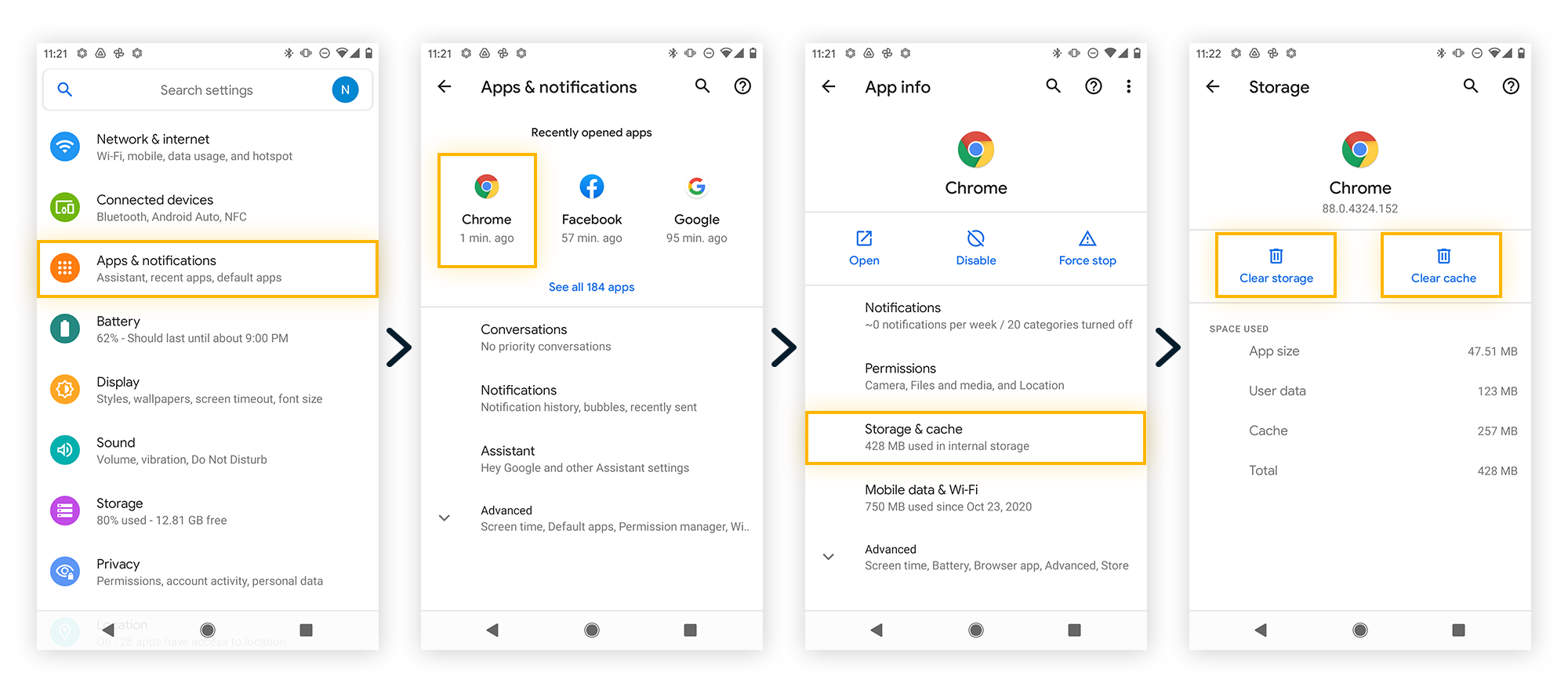
-
Restart your Android device in safe mode.
Press and hold the power button, then choose to restart your phone in safe mode. You'll see Safe Mode in the corner of your screen after your phone reboots.
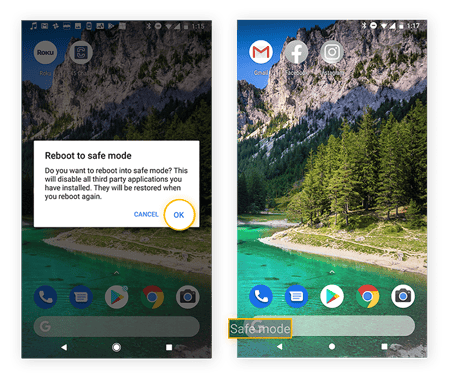
-
Find and remove malicious apps.
Open your Settings and tap Apps & notifications. Then tap See all apps. On the next screen, select Installed apps in the drop-down menu. Review your installed apps and look for any that are suspicious or unfamiliar, then uninstall them. Restart your phone when you're done.
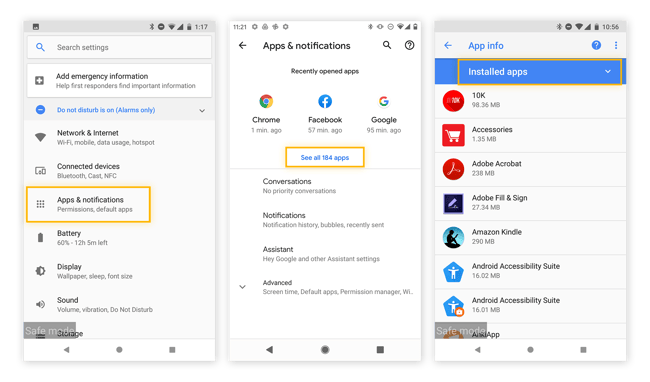
-
Activate Google Play Protect.
The Play Protect feature in the Google Play Store monitors your apps for unusual behavior that can indicate the presence of Android malware. Open the Play Store app, tap your icon or avatar on the top right, and activate Play Protect in the menu.
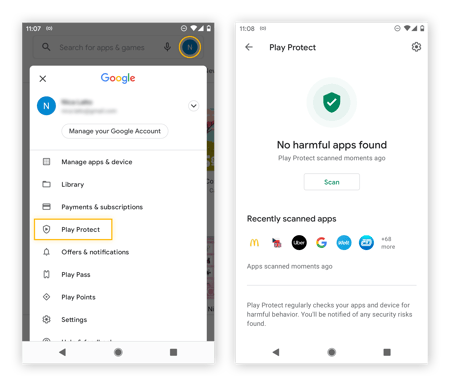
-
Install anti-malware software.
An antivirus app is the best way to automatically detect and remove malware from your Android phone while preventing future infections. Install AVG AntiVirus for Android to keep your Android malware-free in real time.
The infographic below shows the steps you need to take to clear malware from your phone.
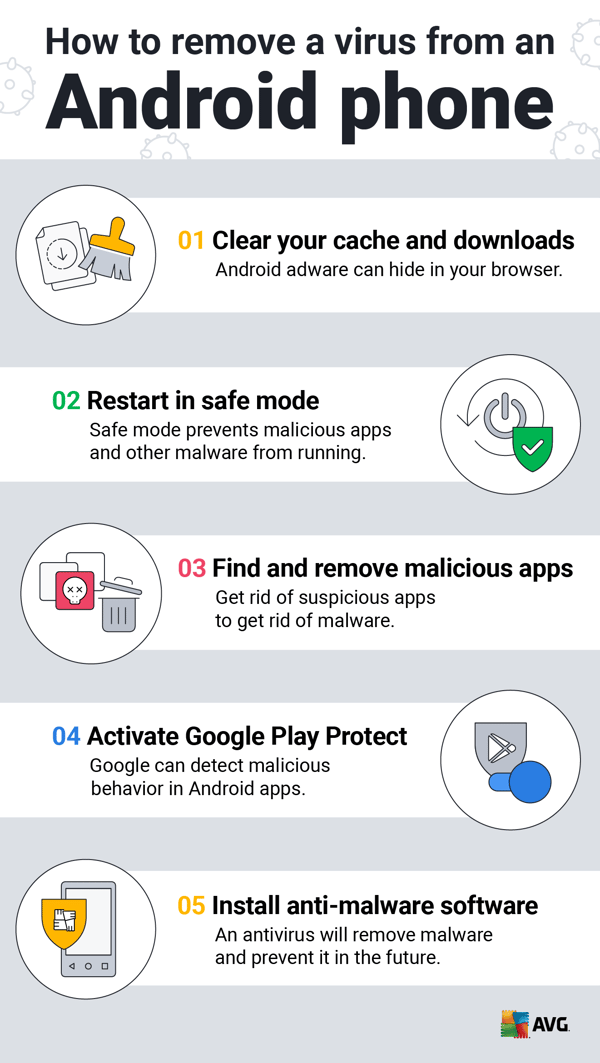
Last resort: wipe your Android
If the steps above don't work, try resetting your phone to its factory default settings. But this is a last resort — so before resetting your phone, try using an Android virus removal app instead. Otherwise, here's how to factory reset your Android:
-
Reset your phone.
Open up your Settings, select System, then tap Reset options. Choose Erase all data (factory reset) and then tap Erase all data. Confirm via the pop-up and restart your phone.
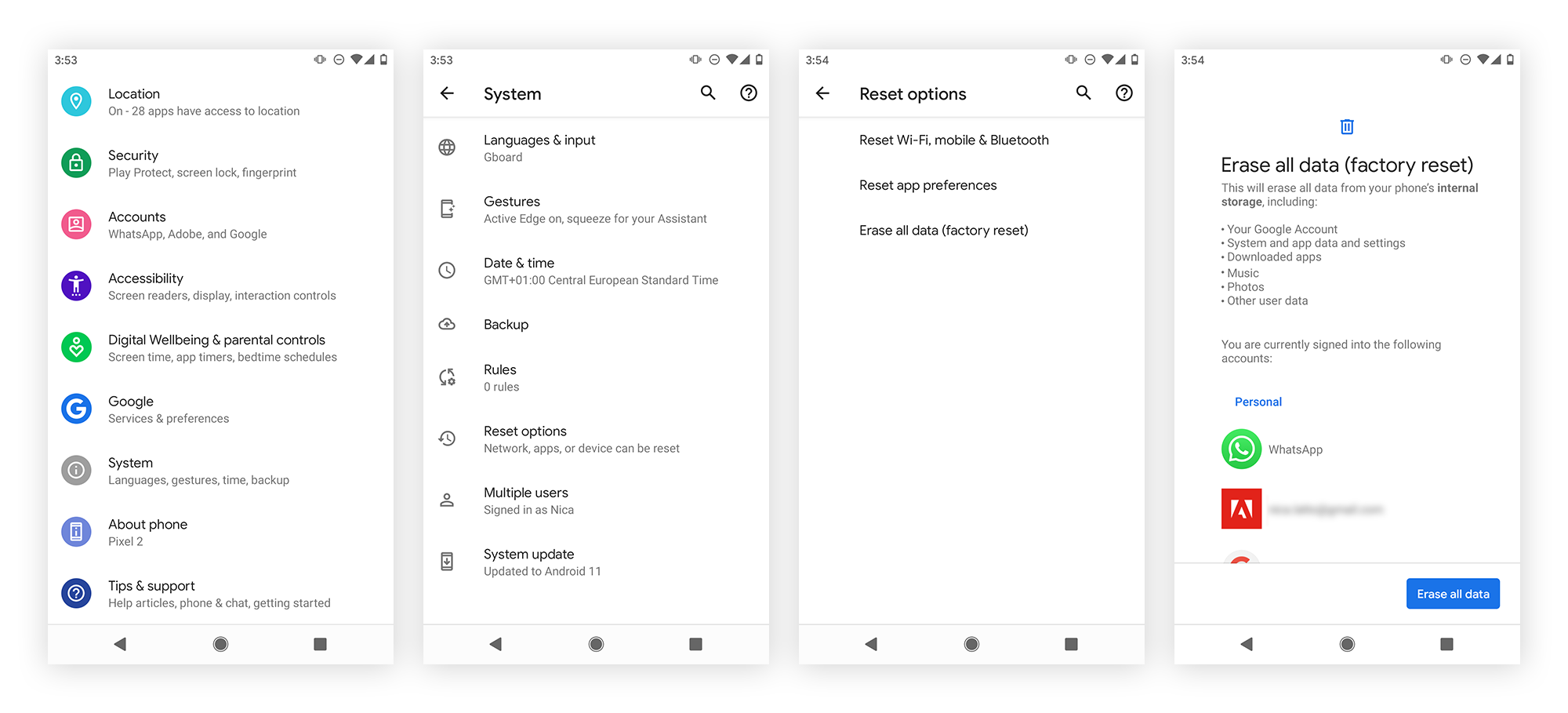
-
Restore your phone.
If you have a backup available, you can restore your phone to get your data back. You need to restore from a backup from before your phone started acting strangely, otherwise you risk installing the Android malware again.
How to remove a virus from an iPhone
A lot of apparent iPhone malware is actually caused by hackers manipulating your browser. So clearing your browsing history and data should resolve iPhone virus issues. If not, try restarting your phone, updating iOS, restoring your phone to a previous backup, or performing a factory reset.
Check out our infographic for the steps you need to take to remove iPhone malware, or skip down to see the steps explained in more detail.
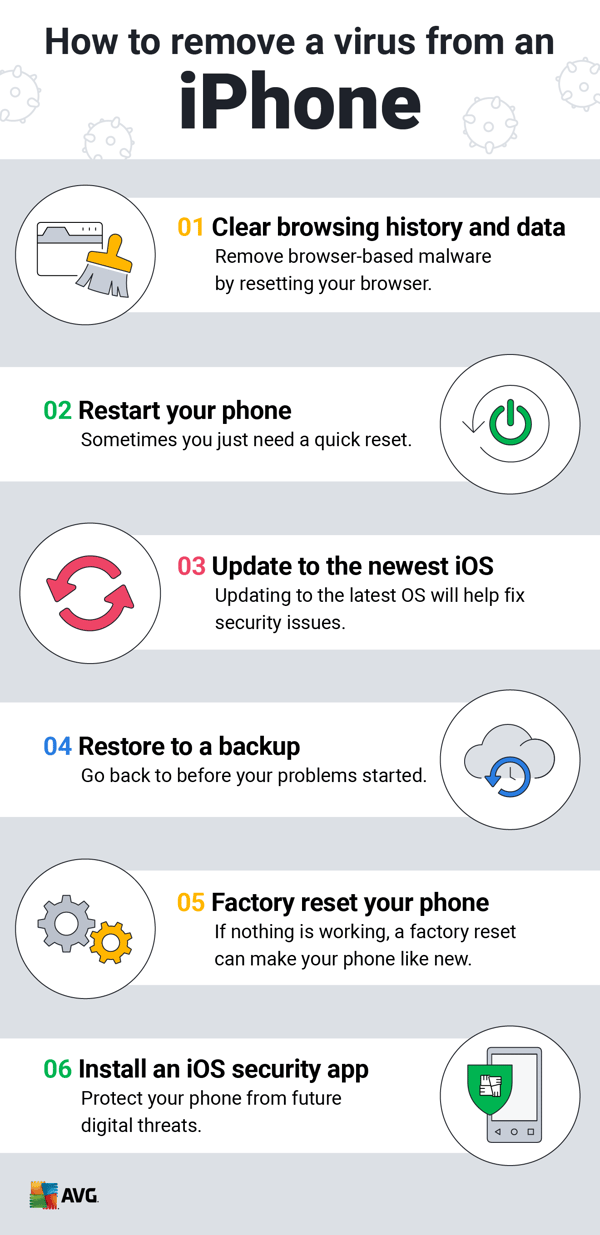
If you think your iPhone has a virus, here are a few ways to fix it:
-
Clear browsing history and data.
Go to Settings and scroll down to the Safari tab. Then tap Clear History and Website Data.
Repeat this process for any other browsers you use.
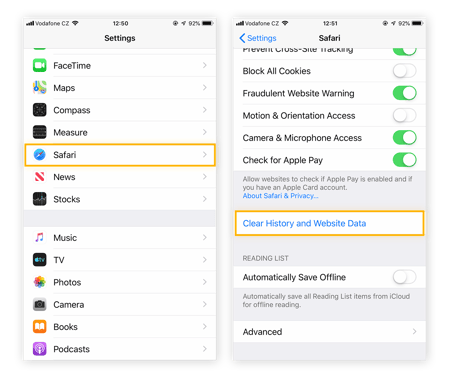
-
Restart your phone.
Hold the power button, turn your phone off, then turn it back on.

-
Update iOS.
Go to Settings > General > Software Update. If you see a software update, install it.
-
Restore your iPhone to a previous backup.
Go to Settings > General > Reset, then choose Erase All Content and Settings. Follow the prompts to restore your iPhone from a backup. Choose a backup you created from before your phone began acting strangely.
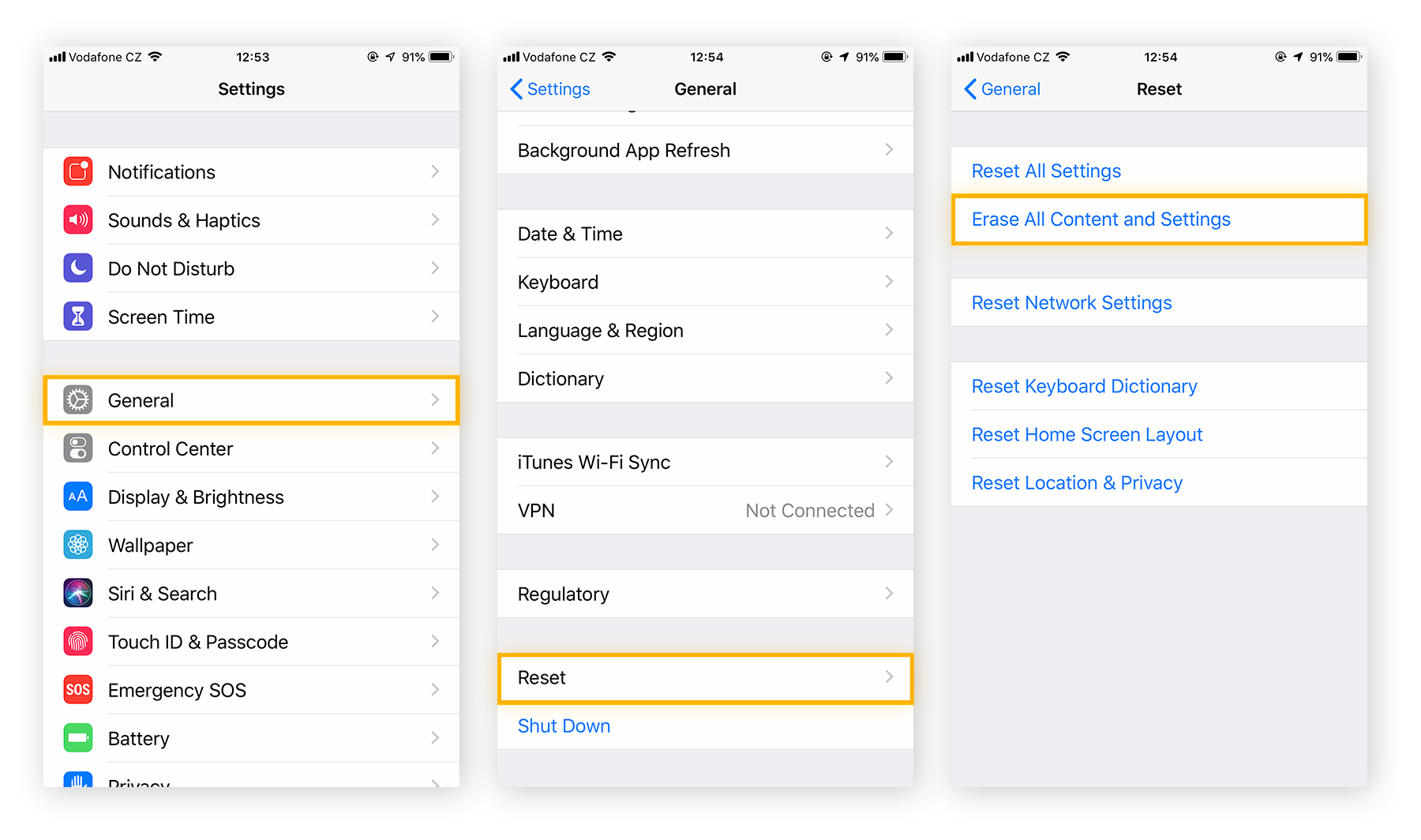
-
Factory-reset your iPhone
If your iPhone is still acting up, go to Settings > General > Reset, then choose Erase All Content and Settings. Choose to reset your phone, rather than restore from a previous iCloud backup.
-
Install an iOS security app.
iOS is very secure, but you can make it even better with a dedicated security app. AVG Mobile Security for iPhone and iPad will make sure your passwords stay safe, your Wi-Fi network is secure, and your private photos stay private, even if your phone falls into the wrong hands.
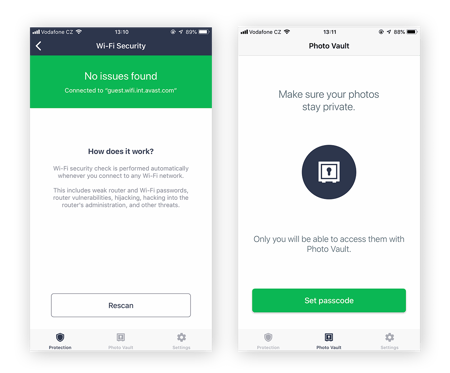 It's easy to secure your Wi-Fi and protect your personal files with AVG Mobile Security.
It's easy to secure your Wi-Fi and protect your personal files with AVG Mobile Security.
Take your security up a level. Install AVG Mobile Security for iOS and start enjoying free, comprehensive protection for your iPhone or iPad today.
How do I know if my phone has a virus?
Unusual behavior and unfamiliar apps are the two biggest warning signs of phone viruses and other malware. These signs will tell you if your iPhone or Android device has a phone virus.
-
Adware pop-ups: Most ads can easily be blocked by using an ad blocker or with a privacy-optimized browser like AVG Secure Browser, which comes with a built-in ad blocker.
If you're seeing pop-up ads on your Android or iPhone even when your browser is closed, you could have adware, which is a type of malware that spams you with extra ads.
-
Excessive app crashing: Many apps crash periodically, but if your apps start crashing regularly for seemingly no reason, your phone could be infected with malware.
-
Increased data usage: If you notice a sudden spike in data usage, that could be a sign that malware is running background tasks on your device or transmitting information or background data from your phone. Remove the phone virus to help control your mobile data usage.
-
Unexplained phone bill increases: Some malware strains attack by sending premium-rate SMS messages from your phone, causing your phone bill to skyrocket. Ztorg Trojans were found doing this in 2017, in addition to deleting incoming messages.
-
Your friends receive spam messages: Some malicious software can hijack your messenger service and spam all your contacts with infected links. If your contacts tell you they received a weird message from your accounts, investigate right away.
-
Unfamiliar apps: If you notice an app on your phone that you don't recall downloading, stay away. Fake apps are a common symptom of malware on Android phones, and they should be uninstalled immediately. An anti-malware phone scanner will take care of this in a few quick taps.
-
Faster battery drain: Malware mischief can use up a lot of energy, rapidly depleting your Android or iPhone battery. If your battery is dying faster than usual, malware might be the cause.
-
Overheating: While the majority of the reasons your phone is overheating are normal and relatively harmless, it's also possible that the cause is a malware infection.
Can Android phones get viruses?
No, Android phones can't get viruses. But Android devices are vulnerable to other types of malware that can cause even more chaos on your phone. From malicious adware to spying apps and even Android ransomware, Android threats are widespread.
One of the reasons Android phones are susceptible to malware is because Android struggles with updates. Updates are important because they often contain critical security fixes to bugs or other vulnerabilities found in the operating system (OS).
Sourcing apps from third-party sources also increases the risk of accidentally installing malware. Android's open-source system and delayed rollout of updates are two major reasons why you should always use a strong antivirus solution for Android as an added layer of protection.
Can iPhones get viruses?
iPhones can't get viruses, because iPhone viruses don't exist. But while iPhones are less vulnerable to malware than Androids, there are other security threats you should watch out for. Phishing attacks and unsafe Wi-Fi networks are just two of the various threats that can affect your iPhone or iPad.
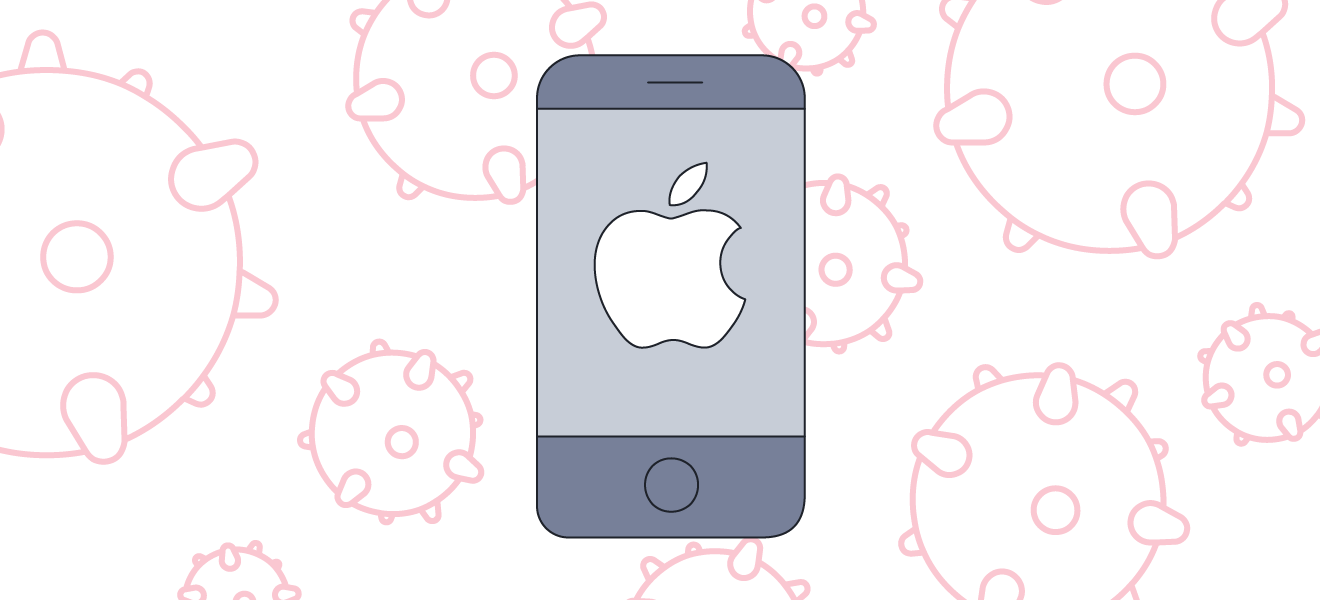 iPhone viruses don't exist (yet), but there are other threats to watch out for.
iPhone viruses don't exist (yet), but there are other threats to watch out for.
Jailbreaking your iPhone — when you remove Apple's built-in user restrictions — makes it just as vulnerable to malware as an Android device. So if you jailbreak your phone, it's important to learn how to do a virus scan for your iPhone. But even without jailbreaking your phone, iPhone users are still vulnerable to other serious security threats — like identity theft.
A well-known 2021 iPhone hack installed spyware known as Pegasus that can steal tons of personal data and turn your phone into a permanent surveillance device. Using a security exploit to leverage a vulnerability in iMessage, Pegasus bypasses iOS 14's built-in security measures intended to prevent this tactic. The hack was created by Israel's NSO Group, one of the world's best hacking groups.
That's why we strongly recommend using a robust mobile protection app for iPhones and iPads. Avast Mobile Security for iOS goes way beyond antivirus or malware protection, keeping you safe every time you go online with free, innovative tools specially designed for your iPhone and iPad.
What can viruses do to your phone?
-
Increase your data usage and rack up unexpected charges by sending spam or premium SMS messages, or subscribing you to unauthorized or premium apps or services.
-
Spam you with ads that generate revenue for the attacker.
-
Install rootkits that give hackers a "backdoor" to your phone.
-
Record phone conversations and send them to hackers.
-
Collect personal information, including your GPS location, contact lists, photos, email address, or banking details.
-
Record your login credentials, including your passwords.
-
Take over your device through rooting.
-
Infect you with ransomware, locking you out of your files.
Before you install a new app, check if it's safe. Read both user and professional reviews to learn what other people think. Some apps might be clean when you download them, but later get infected with malware through updates — so it's important to stay alert.
How to protect against phone viruses
-
Download apps from trusted sources. Google and Apple both vet apps for security before allowing them into their stores. Avoid third-party app stores, and don't jailbreak your iPhone or root your Android phone.
-
Check apps for safety. Malicious apps occasionally find their way onto the official app stores, despite their security precautions. You should always check apps for safety before downloading them. Review the developer profile, read user reviews, and check the download count. Be extra careful when downloading anything brand-new, and don't download from questionable developers.
-
Research before you install. User reviews are great, but you can also see what the pros have to say. Consult expert reviews and independent evaluations of any new app before putting it on your phone.
-
Keep your phone updated. Software providers often issue updates to fix bugs and plug security holes. Always update your phone's operating system and apps with the latest versions.
-
Don't click suspicious links. Suspicious links in emails, text messages, or on social media can contain malware. Don't click on any links you don't expect to be there.
-
Be careful on public Wi-Fi. Unsecured public Wi-Fi networks make it easy for hackers to intercept your traffic. Avoid doing anything sensitive on public Wi-Fi unless you're using a VPN.
-
Use cybersecurity protection. Whether you have an Android or iPhone, a security app will help protect you against malware, phishing, and other mobile threats.
Protect your phone or tablet the easy way
We use our smartphones constantly. And they hold intimate details about our life. Don't let hackers in — build strong walls around your smartphone castle with a robust security and privacy app.
With AVG's cybersecurity protection, you can prevent adware, spyware, phishing, unsafe Wi-Fi networks, and a host of other mobile threats. Download AVG AntiVirus for Android or AVG Mobile Security for iPhone and iPad today for the free protection that millions of people all around the world trust every day.
How To Clean Malware From Iphone
Source: https://www.avg.com/en/signal/remove-phone-virus
Posted by: rosshunned.blogspot.com

0 Response to "How To Clean Malware From Iphone"
Post a Comment